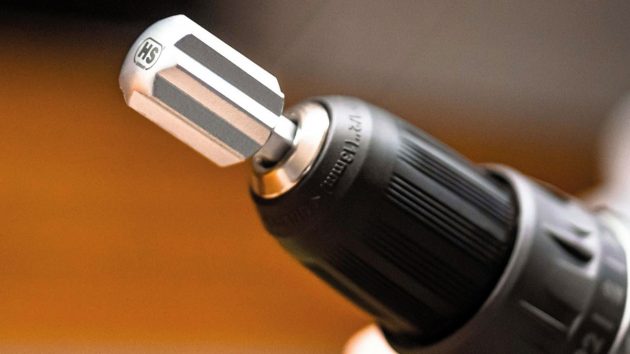Steven Hinchliffe shares an easy way for hoisting sails
In Ask the Experts (PBO January 2023) Kevin Fidgeon at the age of 80 was having difficulty lowering and hoisting sails, writes Steven Hinchliffe.
I have a few tips that might help.
I have a 2005 Hunter Legend 38 and recently replaced my slab reefed mainsail with a fully battened one.
I also have a lazy jack system and bag.
The mainsail on the 38 is huge and heavy so I understand Mr Fidgeon’s problem.
First, lubricate every pulley and block bearing with Harken McLube One Drop.

Winching with a cordless drill. Credit: sprenger.de
It costs about £16 and you only get 15ml but it goes a long way, and is brilliant.
Also apply it to mast sliders and cars as it will lubricate and clean the mast groove if that’s causing resistance.
If the groove is badly gummed up you may need to rig a cleaning cloth and run it up and down.
Ensure the vang and mainsheet have been eased and perhaps lift the boom a little with the topping lift to take the weight off the sail when raising it.
You can buy electric winch handles to take the strain of lifting the main but they cost £600 to £2,000 so are not very appealing.
Instead, I use a strong cordless drill fitted with a stainless steel Sprenger winch bit (bought online for about £37).
My drill has 120NM of torque but I think for a smaller size of sail a drill with 60NM would be fine.
Continues below…
In-mast roller furling problems: how to rebuild a Seldén furling gearbox
Mark Ryan rebuilds his Seldén furling gearbox after wrestling with stiff roller furling for a year and discovers stress-free and…
Get those lazyjacks forward!
Tip for hoisting the mainsail
Sail repair – how to extend the life of your mainsail
After 24,000 miles – including three visits to the Azores, racing round Britain and Ireland and a foray into the…
How to reef – expert advice from PBO Sail Clinic
How do you ensure an efficient reef with a roller-reefing headsail and slab-reefing mainsail? David Harding explains
Ensure the drill is set to the drill function otherwise the torque ratchet may kick in and loosen the bit.
Secure the bit firmly in the drill and then insert it in the main halyard winch and steadily increase the power from the drill.
Be careful: under load the drill will need to be held firmly or it can snatch and make your wrist sore.
Usually I use a manual winch handle to finish the last foot or so to ensure the tension is right.
I have a Raymarine Smart Pilot ST6001 autopilot with a ‘wind vane mode’.
I steer into wind at 2-3 knots and when nose on, I activate the wind vane function which keeps the boat into the wind without anyone on the helm and allows the main to be raised quickly with the drill; it also avoids catching the battens on the lazy jack ropes.
When lowering the main I do exactly the same, except of course the drill is not required.
Even with my new stiff sail I find it folds into the bag nicely in this situation.
I sail mostly with just my wife and have found the process very effective – it has saved toil in manhandling the winch and reduced shouting and bad tempers!
The introduction to this article was amended on 2 June 2023 due to an error
Enjoyed reading Hoisting sails the easy way?
A subscription to Practical Boat Owner magazine costs around 40% less than the cover price.
Print and digital editions are available through Magazines Direct – where you can also find the latest deals.
PBO is packed with information to help you get the most from boat ownership – whether sail or power.
-
-
-
- Take your DIY skills to the next level with trusted advice on boat maintenance and repairs
- Impartial in-depth gear reviews
- Practical cruising tips for making the most of your time afloat
-
-








